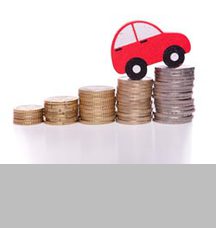To lease or buy a car? If you're unclear which is the best financial option — to buy or lease a new car — don't worry: you are not alone. Between judging the number of miles you drive per year, resale values, down payment options, depreciation and other factors, the decision process quickly gets complicated.
Here's a quick look at the pros and cons of each side of the dilemma, to lease or buy a car.
Buying Advantages
That monthly car payment you've been making? One day it will end. Once you've paid off the loan, the car is yours and you'll be building equity, one of the primary buying advantages. Alternately, if you can buy the vehicle outright, you will save on auto loan interest fees.
If you put lots of miles on your car, tend to treat it roughly or constantly have small children dripping Sippy cups full of red grape juice on your upholstery, that's a consideration that probably tilts in favor of owning your own car. When it's your car, you don't have to worry about lease restrictions or extra fees for excessive wear-and-tear. You also have the freedom to customize your car however you want.
Buying Drawbacks
Buying a car, you're likely going to make a larger down payment and have higher monthly payments than on a lease. If you want a new car every few years, you'll have to negotiate not only the purchase of the new car, but also for the trade-in of your old car — an added hassle unless you enjoy selling used autos. Plus, depreciation may have an impact on your car’s resale value. Another drawback is that by putting your money into buying a car, it's not available for investments or other uses.
Leasing Advantages
On the leasing side, it generally takes less upfront money to put the keys in your hands, which for many is the largest leasing advantage. Payments are usually lower, as well.
If you like to keep a cash reserve, leasing allows you to put less money down to get a car. Finally, for those loving that new car smell, leasing allows you to get a new car at the end of the lease term without the hassle of selling or trading in your old car and worrying about how much your car has depreciated - a plus for many.
Leasing Drawbacks
If you do lease, you'll need to keep monthly auto payments as a continuing item in your budget unless you eventually choose to purchase a car, and you won’t be building equity. For those who put a lot of miles on their vehicles, mileage restrictions mean cash penalties if you exceed the 10,000-12,000 miles per year limit of most leases. Make sure your lease term does not exceed the length of the car warranty: you don't want to risk having to pay for major repairs after the warranty expires. Many leases now require an additional amount in advance to begin the lease. Sometimes called "drive-off fees," this amount may be between 5-10 percent of the cost (usually MSRP) of the vehicle.
Choosing a car that retains its value well is important because the preset value of the vehicle at the end of the lease will impact your monthly payment. And remember, your leasing contract locks you into a set term, reducing your flexibility to change vehicles without breaking the lease and incurring a financial penalty. Finally, realize that it can be difficult to find the exact make and model you're looking to lease, especially at the advertised prices.
Lease vs. Buy a Car?
What it ultimately comes down to are your needs, budget and personal preferences. It's not an easy decision, to lease or buy a car, but Regions auto calculators like "Purchase or Lease a Vehicle?" and other auto calculators are there to help you make your decision.










